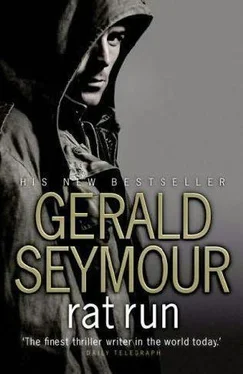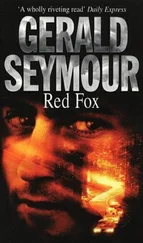Gerald Seymour - Rat Run
Здесь есть возможность читать онлайн «Gerald Seymour - Rat Run» весь текст электронной книги совершенно бесплатно (целиком полную версию без сокращений). В некоторых случаях можно слушать аудио, скачать через торрент в формате fb2 и присутствует краткое содержание. Жанр: Триллер, на английском языке. Описание произведения, (предисловие) а так же отзывы посетителей доступны на портале библиотеки ЛибКат.
- Название:Rat Run
- Автор:
- Жанр:
- Год:неизвестен
- ISBN:нет данных
- Рейтинг книги:4 / 5. Голосов: 1
-
Избранное:Добавить в избранное
- Отзывы:
-
Ваша оценка:
- 80
- 1
- 2
- 3
- 4
- 5
Rat Run: краткое содержание, описание и аннотация
Предлагаем к чтению аннотацию, описание, краткое содержание или предисловие (зависит от того, что написал сам автор книги «Rat Run»). Если вы не нашли необходимую информацию о книге — напишите в комментариях, мы постараемся отыскать её.
Rat Run — читать онлайн бесплатно полную книгу (весь текст) целиком
Ниже представлен текст книги, разбитый по страницам. Система сохранения места последней прочитанной страницы, позволяет с удобством читать онлайн бесплатно книгу «Rat Run», без необходимости каждый раз заново искать на чём Вы остановились. Поставьте закладку, и сможете в любой момент перейти на страницу, на которой закончили чтение.
Интервал:
Закладка:
Rat Run
Gerald Seymour
Prologue
The life of Malachy Kitchen moved on, and he neither knew in what direction nor cared.
He sat bolt upright in the passenger seat, rigid. The radio played a pirate station, the driver's choice of music, but the voice boomed in his ear and could not be escaped.
'It was your shoes. I reckoned them as a toff's shoes.
Don't get the wrong idea. I'm not a man who draws lines under people, those that should get the bestest treatment. What your shoes did, they sort of interested me. I get to see all sorts, and some tickle me and some don't.'
Malachy had slept the last night in a dossers' hostel behind the great canopy of Waterloo station, not well because of the coughing, moaning and snoring in the dormitory. Home for that week had been the rows of dose-packed beds, the smell of the disinfectant and the stink of the fried food in the canteen, the stench of the bodies, the sound of fights and yelled arguments.
Each morning he and the others had been turned out on to the street after breakfast, and the rest had shuffled off up the pavements towards the river. He had sat on the steps between the pavement and the shut door and had waited all day for the scrape of the lock being turned, the bolt drawn down and the creak of the hinges as the door swung open.
'Lighten up, that's what I'm telling you. I saw you, found you, and the shoes hit my eyes, and I thought you were worth giving a lift up to. I see derelicts, vagrants, addicts of alcohol and narcotics, see them all the time, and I have an opinion and I make a judgement. A few times, not often, I get the feeling in my water that a man is worth a few hours of my day. You want to know what gets worst up my nose?
Well, I shall take the liberty of telling you. When I make the effort, and the customer does not, that sticks in my nose and it itches bad. Are you hearing me?
God, man, what does it take you to talk? Don't you understand when you're being helped? Did you fall that far?'
Before the hostel, he had been at the cardboard city in the underpasses of the Elephant and Castle junction. His own space had been a carton in which a twenty-eight-inch widescreen colour television had been packaged, and another that had held a stand-up fridge/freezer. He had begged during the day and drunk at night before sleeping, wrapped in the blanket of a man who had not woken one morning, had been dead when the first commuters had tripped past. Malachy had fallen that far. He had queued for soup; he had shied away from the young policemen who patrolled at night; he had stayed clear of the junkies. Some days he had walked on the bridge beyond the station and had looked down into the muddy swirl of the river, but had not had the courage to lever himself up on to the wall. If he had, and his thin, fleshless fingers had not been able to take the weight, it would have ended.
'When I saw those shoes, stuck out from under your blanket, half covered over with the cardboard, I said,
"Sure as God walks this earth, Ivanhoe Manners, this man can be given a hand up." With me, my friend, you get one chance, one chance alone. You fuck that chance and you don't see me back. Plenty of others to spend my time on. You live under the cardboard, you beg and you drink, and your future is an ambulance in the morning and a space left in an underpass. You want that, you can have it, but the warden told me that since you went into the hostel, there was no smell of drink on you – but it's still one chance with me, one chance alone. I can't do it for you.'
What he possessed were the empty olive-green rucksack, which had been filled with old newspapers to make a pillow in the underpass, the fibre dog-tags that listed his name, number, religion and blood group, the clothes on his back, and the shoes. They were all from time gone by, yet he had clung to them. The rucksack had the grime of the streets on it, tears in the front pouches, and two of the fastening buckles were broken. The dog-tags were from Basic Training, always hidden by his fist when he was in the hostel showers, because they were the proof of who and what he had been before. The clothes, almost unrecognizable now, were those of a civilian who dressed well. The trousers had rips at the knees and were coated with dirt, and the jacket was frayed at the cuffs and elbows. It was held across his chest with string. His pullover had unravelled. His shirt collar was part disintegrated. His socks were holed at the toes and heels and were damp from last night's scrub in the hostel's washhouse. His shoes were brogues. Smart when his mother had bought them for him before he had gone away on the last posting, before he had fallen. When he had been dropped off at wherever this journey was taking him, he thought that the grossly large West Indian social worker would take a stiff brush, a bucket of soapy water and an aerosol spray to the car to clean it. The smell, not commented on, curled the man's nostrils.
'If you don't care to communicate, that's your problem. See if I give a damn. It's in your hands, whether you want to climb out of the shit or whether you want to drop back into it. Folk can feel sorry for themselves and reckon the world's done them wrong, or they can pick themselves up. Doesn't mean I'm confident about you. Satisfaction in my job doesn't come frequent – but I just don't know whether you're crap, useless, or not.'
The car edged out of the traffic flow into a tight gap and parked. He knew the road and had begged in it.
The driver hoisted his rucksack and walked across the pavement.
Malachy followed him into the charity shop. He stood inside the door, nervous and clutching his hands together. He was ignored, except when estimates were made of his chest size, waist measurement and inner leg. He was not asked what he wanted and the banter between the staff and the social worker did not include him. The clothes were from house clearances, or from the dead- They were chosen for warmth, because autumn was closing in and the air carried a spit of rain. Two pairs of trousers, three shirts, underclothes, socks, a brown-flecked overcoat that a stooping old man might have worn, an anorak, a sports jacket and a pair of bulging trainers were piled on the counter, paid for, then forced into the mouth of the rucksack.
They stopped at a supermarket. Milk, bread, margarine, a jar of coffee, a packet of teabags and a pile of chilled meals for one person were dropped into the basket. He had nothing to decide: the food was chosen for him, and the dusters, the toothpaste, the disposable razor blades and the shoe polish.
He was driven on.
He saw the wide smile, the flash of the teeth.
'Oh, don't thank me, don't bother to. Don't think of thanking me because you don't know yet where I'm taking you… There's a cop I know at Walworth Road who says, where I'm taking you, it's best not to go there unless you're inside a battle tank. It's what he says.'
Behind them was the street market that he was told was a den for pickpockets, and the little corner shop that had been robbed twelve times in the last twenty-four months, and then the estate loomed.
'Welcome to the Amersham. The contract architect came back five years after it was finished, walked round and saw what he had created. Then he drove home and topped himself, that's what they say.
Welcome to the Amersham. estate.'
A concrete edifice, his guide remarked, that was home to eleven thousand souls, and now him, towered through the windscreen on which the wipers worked hard. He could have asked his driver to stop, could have pushed himself up out of the car, taken the rucksack and emptied it out on to the back seat, could have walked away into the thickening rain. They came into the forest of the blocks from which high walkways branched. On the begging pitches, in the underpass and the dormitory of the hostel, there had been a clinging sense of camaraderie, and he knew that if he came on to the estate he would be without that comfort.
Читать дальшеИнтервал:
Закладка:
Похожие книги на «Rat Run»
Представляем Вашему вниманию похожие книги на «Rat Run» списком для выбора. Мы отобрали схожую по названию и смыслу литературу в надежде предоставить читателям больше вариантов отыскать новые, интересные, ещё непрочитанные произведения.
Обсуждение, отзывы о книге «Rat Run» и просто собственные мнения читателей. Оставьте ваши комментарии, напишите, что Вы думаете о произведении, его смысле или главных героях. Укажите что конкретно понравилось, а что нет, и почему Вы так считаете.












